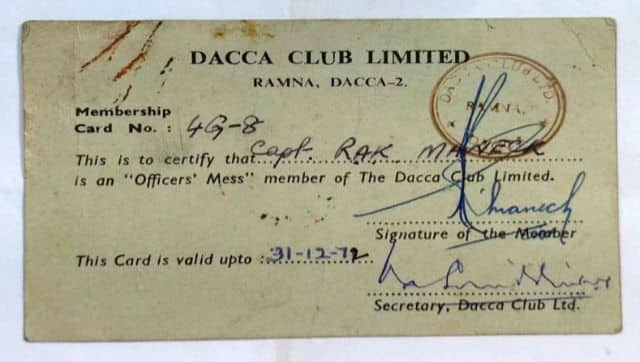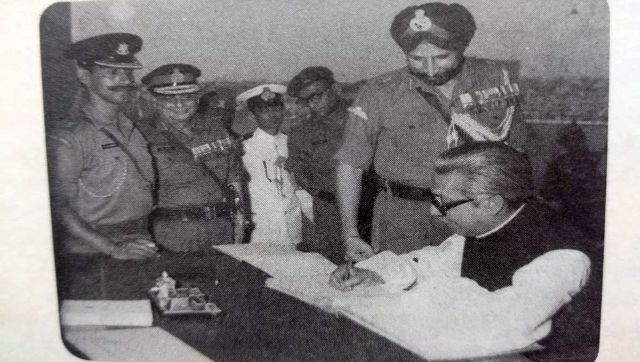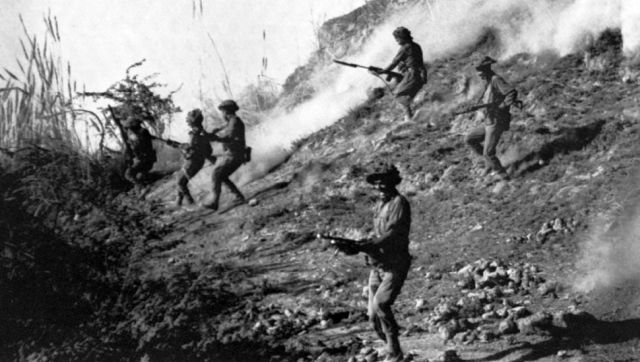Fifty years ago, in December of 1971 India undertook what many consider as the country’s greatest feat of arms, and ranks high among the all-time great military campaigns in the annals of history — the Bangladesh Liberation War. Today as the country commemorates the valour and bravery displayed by the Indian Armed Forces in the efforts to create the new nation of Bangladesh, away from the melee and clamour of ‘we won this and we won that’, Lt Col RA K’Maneck (retired) has a different version, or let’s say, another lesser-known angle to remembering the war. The then Captain, aged 27, doesn’t think of himself as a war hero and says that for him the memories that he has of the 1971 War isn’t about the heroics or the artillery fire that they braved, but about the moments he shared with his troops, the jokes and banter and the everyday happenings. He tells us in his words what the war felt like to him and his then unit — 4 Guards (1st Rajputs), headed by Commanding Officer Colonel Himmeth Singh.
***
I was, and still am a very proud Sikh Light Infantry officer, having parental claims to this regiment, and was posted along the Indo-Burma border in the late 1960s. Unfortunately, we had an incident in our unit, and I was airlifted to Brigade HQs in Aizawl, as a disciplinary case. I was then attached as a young captain to Colonel Himmeth Singh’s 4 Guards, who at first chose to ignore me, but on hearing my version of events took me under his wing and became and remained my mentor. While official records show that the war lasted for 13 days (3 December -16 December), our unit 4 Guards, like quite a few units, were deployed, and carried out actions along the borders for a considerably longer spell. Deployed in the Mizo Hills, concentrating on the Mizo hostiles, who were entering from the Chittagong Hills, we were ordered to move to Agartala, in early April and prepare for war. If we thought we would be plunging into a war right away, we were in for a big disappointment. We were tasked with carrying out what we termed as ‘The Phony War’ in which we carried out hit-and-run raids into East Pakistan. What really stands out in my mind about these raids was the fact that we often would dress in lungis and vests during action. We, in our lungis, and some of the locals fighting side by side must have been a sight to behold! East Pakistan (now called Bangladesh) is a riverine country — full of nullahs and marshy land. Moving in this slush, with our weapons was no easy feat. In such conditions, we feared for our rifles, as they kept filling up with water and sludge, making them ineffective. There is a saying — necessity is the mother of all invention and the fact that we needed to keep our guns dry while trudging through the muck led to the genius idea of covering our muzzles with condoms. Thrilled with our ’eureka moment’, we tasked our doctor to gather at least three condoms a man. Imagine his look when we told him this! At first, he laughed it off, perceiving it to be a prank, only later realising we were quite serious, prompting him to kick into action and getting us the contraceptives. We finally crossed the international border on 30 November 1971 to reach our objectives after wading through, at times, neck-deep water. We were in an environment where we were walking for miles with wet belongings, lack of proper food and overall conditions that led us to believe that even a single dry cigarette and a pair of dry socks and shoes was pure bliss. A memory of Captain LM Singh and me discussing how welcomed a non-vegetarian meal with hot chapatis would be. And Captain LM told me that he would catch a ‘murga’ that never came to be, even when we walked through sparsely populated villages. However, today, when I think about those days I believe it was our collective ‘suffering’ — as I would call it — that brought us closer to one and another. Another tale that brings a smile to my face is that of Maj Chandrakant, who went on to be awarded a Vir Chakra, who for two mornings just couldn’t go to relieve himself, as he would have enemy fire being brought down the moment he lowered his pants. He running with his pants down was something that we still laugh about to this day. Once we crossed the River Meghna, which for those days was a completely unorthodox, and untried plan, it was a mad rush to Dacca. When we entered Dacca and the war was declared over, the mood was upbeat; celebrations had already begun. It was funny to see how all modes of transport were used. At one stage, we had our General leading in the only motorised auto-rickshaw, while the locals brought in cycle rickshaws, bicycles and even bullock carts to carry loads. We also commandeered a fire engine. And while the locals helped us in every which way, they still wouldn’t handle the body of a Pakistani soldier, thinking it was the ‘shaitaan’ (devil)! Once at Dacca and the war being declared over, all I could think of was a drink and that led me to the Dacca Intercontinental Hotel. While that was me, then there was Col Himmeth Singh. While we gallivanted and drank and made merry, he went by himself to look for some of our Prisoners of War, at the Jaggannath Hostel, in the university campus, who were reported to be kept in Dacca. But that was Colonel Himmeth Singh for you. Today I can’t help but take note that our divisional commander, our brigade commander and our commanding officer ended the war as they had started it — with a game of golf first in Agartala and a subsequent round at Dacca. [caption id=“attachment_10211741” align=“alignnone” width=“640”]  The much cherished membership card to the Dacca Club, which Lt Col R A K’Maneck still holds on to. Image Courtesy: By arrangement[/caption] As we stayed on, you can imagine, there would be a lot of memorabilia collected by most. I am left now with only a membership card to the Dacca Club, which I cherish to date, which lists me as a service member card: 4G -8, valid till 31 December 1972. We stayed back in Dacca till the end of March 1972 when we had a farewell parade at which Sheikh Mujibur Rahman, who served as the first president of Bangladesh, took the salute. He has also signed our visitor’s book. [caption id=“attachment_10211751” align=“alignnone” width=“640”]  Bangabandhu Sheikh Mujibur Rahman, the founding leader of Bangladesh and the country’s first prime minister, signs the visitor’s book of the paltan. Image Courtesy: By arrangement[/caption] We had a lot to do while we stayed there; one of our main priorities was transporting the Pakistani PoWs to their camps, for onward dispatch to India. A memory that hasn’t been recorded by too many is that we had issued some of our weapons to the PoWs for their protection against the locals, especially the women — armed with sickles, spades, brooms and rolling pins. Another tale that is clearly etched in my mind is that related to our Commanding Officer’s wife, Mrs Jane Himmeth Singh, who had visited us in Dacca, when civilian flights had commenced, and Bangla Biman had started operating. She was due to fly back, but with the number of people wanting to fly out tickets were hard to come by. A colleague and I tried to reason with the Bangla Biman staff but to no avail. It was then that I chirped in that we would report the matter to the Banga Bandhu, as the Sheikh was called, and that promptly got us a ticket. Such was the war, and such memories are all that remain. As told to Roshneesh K’Maneck Also read:
- 1971 India-Pakistan war: The silent screams of those missing in action
- 1971 war: When world woke up to Pakistani terror and India’s endeavour to save humanity in Bangladesh
- 1971 war: How IAF’s air superiority helped in the early fall of Dhaka
- How 1971 Bangladesh liberation war emboldened Indian Navy’s three-dimensional firepower
Read all the Latest News , Trending News , Cricket News , Bollywood News , India News and Entertainment News here. Follow us on Facebook, Twitter and Instagram.


)

)
)
)
)
)
)
)
)



